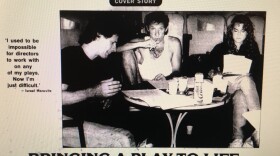Parth Shah
Parth Shah is a producer and reporter in the Programming department at NPR. He came to NPR in 2016 as a Kroc Fellow.
-
Far from being "the great equalizer," COVID-19 has disproportionately sickened and killed African Americans and Latinos in the U.S. Many of the reasons for these inequalities reach back to before the pandemic began. This week, we return to a 2019 episode that investigates a specific source of racial disparities in medicine and beyond—and considers an uncomfortable solution.
-
Confined to our homes, many of us are experiencing a newfound appreciation for our social relationships. What we may not realize — and what physicians and researchers have only recently started emphasizing — is the importance of these connections to our physical health. This week, we talk with former U.S. Surgeon General Vivek Murthy about why he considers loneliness a matter of public health, and how we can all deepen our social ties.
-
Many Americans feel an obligation to keep up with political news. But maybe we should be focusing our energies elsewhere. Political scientist Eitan Hersh says there's been a rise in "political hobbyism" in the United States. We treat politics like entertainment, following the latest updates like we follow our favorite sports teams. Instead, he says, we should think of politics as a way to acquire power and persuade our neighbors to back the issues we support.
-
Where is the line between what is real and what is imaginary? It seems like an easy question to answer: if you can see it, hear it, or touch it, then it's real, right? But what if this way of thinking is limiting one of the greatest gifts of the mind? This week, we meet people who experience the invisible as real, and learn how they hone their imaginations to see the world with new eyes.
-
As a society, we talk about sex more openly today than ever before. But so much still goes unsaid. This week on the Hidden Brain radio show, complicated stories of intimacy and attraction.
-
How many ads have you encountered today? On this week's radio show, we discuss the insidiousness of advertising in American media.
-
This week on the Hidden Brain radio show, we dig into the culture and psychology that determines the foods that make us salivate and the scents that make us squirm.
-
More than 70,000 people died of drug overdoses last year — many of them from heroin and other opioids. One of the most widely-used tools to confront this crisis is a drug called naloxone. It can reverse an opioid overdose within seconds, and has been hailed by first responders and public health researchers. But earlier this year, two economists released a study that suggested naloxone might be leading some users to engage in riskier behavior — and causing more deaths than it saves. This week, we talk with researchers, drug users, and families about the mental calculus of opioid use, and why there's still so much we're struggling to understand about addiction. For more information about the research in this episode, visit https://n.pr/2OZfuGQ.
-
We all know the downsides of being poor. But what about the downsides of being rich? This week, we explore the psychology of scarcity...and excess.
-
Decades ago, a group of women accused a prominent playwright of sexual misconduct. For the most part, the complaints went nowhere. In 2017, more women came forward. This time, people listened.
-
How many ads have you encountered today? On this week's radio replay, we discuss the insidiousness of advertising in American media.
-
It doesn't just keep them entertained. New research highlights an unexpected positive impact — and also shows that when a parent sings to a child, the parent can benefit, too.














